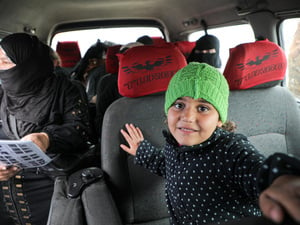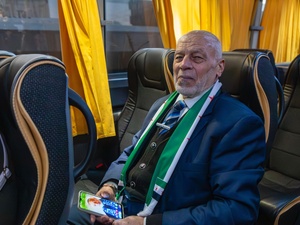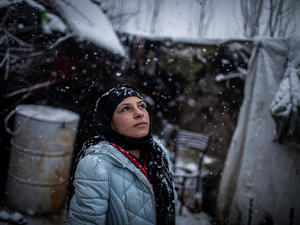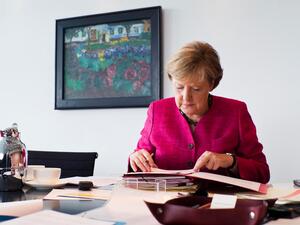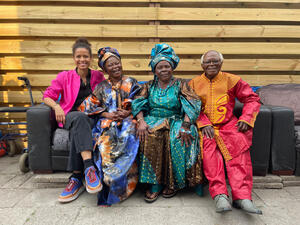New start for victims of war in city of peace
New start for victims of war in city of peace

Syrian refugees are eager to learn at Julia Faire's English classes.
COVENTRY, United Kingdom, April 1 (UNHCR)- At Coventry's Jesus Centre, in the middle of the city, Julia Faire was struggling to contain the enthusiasm of her new group of students.
"No, she is not 'ugly', she is 'beautiful'," the English teacher intoned, stressing the adjectives. "And he," she continued, indicating one of the pupils, "is… anyone? Handsome."
Hussein Ejrf smiled. The 44-year-old has been wheelchair bound since an explosion in his native Quneitra on Syria's Golan Heights in 2012 took both his legs. After three years exile in Lebanon where he couldn't receive adequate care, he and his family, wife and four children, were resettled in the UK last November with UNHCR's help.
The family came to Britain as part of the government's commitment to take 20,000 Syrian refugees by 2020 under the 2014 Vulnerable Persons Relocations Scheme for Syrian refugees.
But there is a restlessness among Faire's students, which on this particular Monday in March included Ejrf's wife and two sons. 17 year-old Mustafa Ejrf said he was keen to study IT, but needs first to improve his English. "We need more lessons, we need to learn faster."
It is an impatience to get on with disrupted lives that is common among the 166 individuals now resettled in Coventry, among the first three local councils in the UK to welcome Syrian refugees under the 2014 scheme. To them, Coventry is more than just a safe haven; it is a future they didn't choose but are now determined to embrace.
Abdulmunem Radwan and his family have been here since September 2014. A family lawyer back in Homs, which has witnessed some of the fiercest fighting in Syria's five-year-old conflict, the 45-year-old Radwan fled the violence as it got ever closer first to the city apartment he lived in with his wife and three young children and then his mother's house on the outskirts.
They left for Jordan in 2012, where they registered as refugees but rented privately. It was not a happy experience for Radwan. Unable to work there legally as an asylum seeker, the family struggled to settle in Mafraq, in Jordan's north, where, he said, relations between locals and the many refugees Jordan has taken in were sometimes fraught. So when the possibility of resettlement to the UK came, he jumped at the chance.
"To be safe, that was the objective," Radwan said, reluctantly revisiting his reasons to leave Syria. "Just imagine your children can be slaughtered or are in constant danger, there are rockets… you expect death any time, any moment."
Educated and with good English, Radwan has been able to settle more quickly than most, even making a little money on occasion interpreting for Coventry City Council and helping new arrivals settle.
But he remains reliant on local benefits and is realistic about his prospects. To retrain for the UK's legal profession is both too expensive and time consuming. He hopes to use his background in law and language skills to work with English courts as an interpreter. But he is willing to do anything.
"I hope to get a full time job. Any job. I don't give up. I will do my best to achieve this, believe me. Not for me, but for my children."

Safe at last: Abdulmunem Radwan with his UK residence permit.
Finding work for the refugees remains the priority for the three non-profit organisations that in Coventry has coordinated the city's refugee programme with local authorities - Coventry Law Centre, the Coventry Refugee and Migrant Centre and the Citizens Advice Bureau - but Peter Barnett, the council's point man for the programme admits that it has so far been a hard task, with language barriers proving the most formidable.
There have also been some less savoury incidents. Barnett decided to move one family from their designated flat when, during minor repair work to fix a leak, someone daubed 'Refugees go home' on the outside wall.
That, he insisted, was an isolated incident. "We've done what we can in Coventry. We would like to do more. But we've done what's appropriate for this city and I am very proud of that."
There is, moreover, a "moral imperative", he said, not least in a city with a history like Coventry's. In November 1940, the city suffered one of the most intense Luftwaffe bombardments of any UK city in World War II. The firebombing devastated the city centre, almost completely levelled the historic cathedral, and destroyed or damaged more than 4,000 buildings and homes. More than 560 people were killed and thousands were left injured and homeless.
It has since become known as the "city of peace and reconciliation" because of the role of Coventry Cathedral and its message of forgiveness after World War II. Its Cross of Nails - made from nails found in the ruins of the old cathedral of which a spire and parts of the outer walls have been preserved - has been replicated in 160 sites around the world and has become a global symbol of peace.
"It's just the right thing to do," said Barnett of taking in refugees. And that is the message he brings to colleagues from around the country who are now increasingly looking at Coventry as a model for how to integrate vulnerable refugees arriving through the government's resettlement scheme.
He also seeks to allay concerns that local councils are setting themselves up for a huge new set of dependants.
"It's not like that. These are very proud people; they are not looking to be a drain on resources; they want to integrate and settle. And the families that come are supportive of each other."
Housing is a challenge. The City Council has placed refugee families in a mixture of social housing and with private landlords. But, like almost anywhere in the UK, there is a crunch and benefits only go so far to covering rents.
These are problems Barnett concedes could be more acutely felt down the road. For now, he takes immense satisfaction at seeing families like the Akils, originally from Idlib in northern Syria, begin their new lives in Longford in the north of Coventry.
Their narrow semi-attached house on a small estate is a big change for Khalid Akil, 45, whose home in Syria, he said, was 400 square metres and boasted olive trees and grapevines. But he is hugely relieved to feel safe again and grateful for the housing and schooling that Coventry has provided.
A former shoe shop owner, Akil, wife Faten and four children fled intense fighting and aerial bombardments in 2012 to Lebanon, where he had previously traded. There, however, he found only closed doors. Forced to rent privately in a market where landlords are asking refugees to pay a year's advance, and unable to work most jobs legally, he turned to his two young sons to help pay bills. They rented - off the books - a vegetable shop from a friend and the boys, 10 and 11 at the time, helped in the store and took small jobs elsewhere.
"Life in Lebanon was very difficult," said Akil, whose hand shakes due to a nerve condition that, he said, is getting better now as the stress of war and displacement abates. "Every day was worse than the other. I see my children, 10 and 11, work and I cannot dream of anything.
Now, he said, at least he can hope for a better future for them, education, a good job.
The children have started school. Language remains an issue and they speak with varying degrees of confidence. The oldest, Abdel Latif, 14, prefers maths at school, in part because it is the least language intensive. Omar, 13, is much more comfortable talking and is getting accustomed to English habits. A football fanatic, he lists his favourite teams as Barcelona and Manchester United. But, he added with a smile, "I will learn to love Coventry City."
Still, both boys did not hesitate when asked about home.
"I miss it," said Abdul Latif. "I miss my friends and family."
By Omar Karmi


